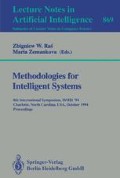Abstract
In this paper three formal models of selection operators (two known from the literature and one newly porposed) for genetic algorithms, used to learn structured concepts descriptions containing small disjuncts, are presented. The evolution of a population, according to these operators, with a generation gap equal to or less than one, is investigated in order to assess their ability to let different species emerge and coexist; finally, the average asymptotic behaviour of the population is determined. Experimental results confirm both bevahiours previously reported in the literature and the prediction of the new model.
Preview
Unable to display preview. Download preview PDF.
References
Debb K. and Goldberg D. (1989). “An Investigation of Niche and Species Formation in Genetic Function Optimization”, Proc. 3rd Int. Conf. on Genetic Algorithms (Fairfax, VA), pp. 42–50.
De Jong K.A. and Spears W.M. (1991). “Learning Concept Classification Rules Using Genetic Algorithms”, Proc. IJCAI-91 (Sidney, Australia), pp. 651–656.
De Jong, K.A. Spears W.M. and Gordon F.D. (1991). “Using genetic Algorithms for Concept Learning”, Machine Learning, 13, 161–188.
Giordana A. and Saitta L. (1993). “REGAL: An Integrated System for Relations Using Genetic Algorithms”, Proc. 2nd. International Workshop on Multistrategy Learning (Harpers Ferry, WV), pp. 234–249.
Giordana A., L. Saitta and F. Zini (1994). “Learning Disjunctive Concepts with Genetic Algortithms”. Proc. Machine Learning Conference 94 (New Brunswick, NJ), In press.
Goldberg D.E. (1989). Genetic Algorithms, Addison-Wesley.
Goldberg D.E. and Richardson J. (1987). “Genetic Algorithms with Sharing for Multimodal Function Optimization”, Proc. 2nd Int. Conf. on Genetic Algorithms (Cambridge, MA), pp. 41–49.
Greene D.P. and Smith S.F., “Competition-Based Induction of Decision Models from Examples”, Machine Learning, 13, 229–258.
Holte R., Acker L and Porter B. (1989). “Concept Learning and the Problem of Small Disjuncts”. Proc. IJCAI-89 (Detroit, MI).
Janikov C.Z. (1993). “A Knowledge Intensive Genetic Algorithm for Supervised Learning”, Machine Learning, 13, 198–228.
Vafaie H. and De Jong K.A. (1991). “Improving the Performance of Rule Induction System Using Genetic Algorithms”, Proceedings First International Workshop on Multistrategy Learning, (Harpers Ferry, WV), pp. 305–315.
Venturini G. (1993) “SIA: a Supervised Inductive Algorithm with Genetic Search for Learning Attribute Based Concepts”, Proceedings European Conference on Machine Learning, ECML-93 (Vienna, Austria), pp. 280–296.
Author information
Authors and Affiliations
Editor information
Rights and permissions
Copyright information
© 1994 Springer-Verlag Berlin Heidelberg
About this paper
Cite this paper
Giordana, A., Neri, F., Saitta, L. (1994). Formal models of selection in genetic algorithms. In: Raś, Z.W., Zemankova, M. (eds) Methodologies for Intelligent Systems. ISMIS 1994. Lecture Notes in Computer Science, vol 869. Springer, Berlin, Heidelberg. https://doi.org/10.1007/3-540-58495-1_13
Download citation
DOI: https://doi.org/10.1007/3-540-58495-1_13
Published:
Publisher Name: Springer, Berlin, Heidelberg
Print ISBN: 978-3-540-58495-7
Online ISBN: 978-3-540-49010-4
eBook Packages: Springer Book Archive

